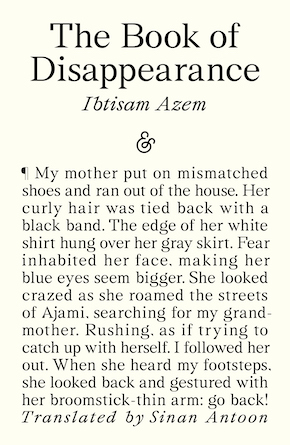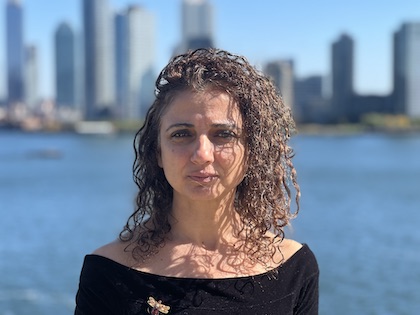Without a trace
by Ibtisam Azem
Ariel dragged himself out of bed and went to the kitchen. He wanted to sleep some more, but couldn’t. Books and newspapers were scattered everywhere in the living room. He had to tidy up.
It took seven steps to get to the little kitchen. He opened the big silver refrigerator and stood there perplexed, as if he’d forgotten that he came to drink water. He took a bite out of a red apple that sat on one of the shelves. He had brushed his teeth before going to sleep, but the sour taste of wine from the night before lingered. Maybe the apple will change that.
He should take a shower, he thought, as he scratched his head. He put the apple on the tiny kitchen table. He went to the bathroom, jumped under the shower, and thought about his ten-day vacation. He has to buy a few things for his apartment, including a new loofah. As he scrubbed his body under the hot water, he heard an impulsive ringing.
It was rare for anyone to come without calling beforehand. Maybe it was by mistake, or the mailman. The ringing didn’t stop and it was joined by knocks and banging on the door. He shut off the water, took a towel, and wrapped it hastily around his waist. He went and opened the door without even asking who it was, or looking through the peephole.
It was his ex, Zohar. He didn’t recognize her at first. She had cut her coal-black hair short and dyed it a light chestnut color that didn’t suit her.
“Shalom. Why did it take you forever to open the door? And why are you still asleep when there is such a big mess in the country?”
“I didn’t know you were an investigator now. What are you talking about? What mess? Was there a bomb attack?”
He asked her to come in. He hadn’t seen her since they broke up. It was strange for her to visit. Maybe it was one of her crazy fits and she wanted to get back together. As he closed the door, he heard her weeping. He’d never seen so much fear in her eyes. He took her in his arms.
“We’re finished. They’ll finish us off.”
“Who will be finished?”
“Didn’t you hear the news? The Palestinians have disappeared without a trace. Not here nor in Judea and Samaria. I don’t know if we did it ourselves, somehow, or if they’re hiding somewhere. Either way, Arab countries will attack us and tear us to pieces.”
Ariel laughed.
“You’re hallucinating. Did you drink something last night? Is it a new kind of hash? I want some too.”
She wiped away her tears and pushed him aside. “Don’t make light of the situation. It’s not a joke. Didn’t you hear the news?”
You don’t get it, do you? All the Palestinians have disappeared. You won’t find Alaa, or the others. I don’t care about them. But we need to know where they went and what is happening!”
He picked up the remote, turned the radio on, and scanned it looking for Army Radio. He turned the TV on too, but kept it muted. The announcer was reminding listeners that the Palestinians have disappeared.
Ariel was incredulous. “What are they talking about? I don’t understand.”
“The Arabs are gone! Simply gone. None of them showed up to work. Their houses are empty and their phones ring, but no one answers. The workers, beggars, prisoners, teachers, patients, café owners, cooks, and garbagemen. They are aaaaall gonnnnnne.”
She took a deep breath and continued.
“No one knows what is happening. They disappeared, Ariel. Ni’lemu ata miivn ma zeh ni’lemuuuuu?”
“Calm down please. You’re losing it. I’ve never seen you like this.”
“What about your Arab friends? They didn’t tell you about it?”
“I was with Alaa last night until around eleven or so. We talked a bit and then he went to his apartment. Wait, I’ll call him and you’ll see for yourself.” Ariel went to the bedroom and put on black underpants and a pair of jeans, and a white V-neck T-shirt. He came back with his cell phone in hand and dialed Alaa’s number. Zohar sat on the couch, looking out the window to her left.
“Either his phone is turned off or he hasn’t got signal. He’s supposed to be at work now. We came back relatively early so he could get up in time.”
“You don’t get it, do you? All the Palestinians have disappeared. You won’t find Alaa, or the others. I don’t care about them. But we need to know where they went and what is happening!”
“I’ll go knock on his door. Wait here!”
He went out barefoot and ran down to the third floor. He rang the bell, confident that Alaa would open the door in no time, if he wasn’t at work. Taking time to open the door doesn’t mean anything necessarily. Alaa’s usually late. Ariel rang the bell several times and then started banging on the door and calling out, “Alaa, Alaa, ata bu?”
When he went back up Zohar was getting ready to leave.
“He’s not answering.”
“You mean he disappeared with the others.”
“I don’t want to get into an argument, but I don’t think he’s disappeared. Maybe he’s wiped out and wasn’t able to go to work. We drank a bottle of wine last night and he was tired. His phone is off and he only turns it off when he’s asleep.”
“You still don’t get what’s happening. Listen to your voicemail. Listen to the news. This is the nonchalant attitude that ruined our relationship. I’m going.”
He asked her to stay, but she was determined to leave. He checked his voicemail. “Ariel, it’s your mother. Please call me back as soon as you get this.”
“Ariel, Mother here again. Call me! Where are you? Why is your phone turned off? I’m very worried about you. Please call.”
“Hi Ariel, Matthew here. I’m sure you’ve already heard. I know you’re on vacation, but this is an emergency. Call us right away. We sent several emails. Please call ASAP.”
“Shalom Ariel. This is Dany. I returned two days ago and I’d planned to call you earlier to have a drink, but am calling now because of what happened. Maybe you have some information or explanation? Please call me.”
“Ariel, this is Zohar. Please call me.”
“Zohar again. I’ll stop by your place, maybe you’re there. I’m worried about you. Call me.”
He felt numb. He couldn’t believe what was happening. As if it was doomsday. Is it a war? He called Alaa again. No answer. He couldn’t even reach voicemail, to say a sentence or two in the hope that Alaa would call back. All he got was the automatic message: “The number you called is outside the service area. Please try again later.”
He called his mother, who said in a shaky voice: “Where are you? I’ve been trying to get ahold of you since this morning. I’m very worried. I miss your father. Were he alive we’d know what is happening.”
“How about good morning first, Mother? Please calm down. No need to worry this much. Everything will be fine. Had there been any danger, we would’ve known right away. Please calm down.”
“But the news is worrisome. It reminds me of Yom Kippur when the Arabs attacked us from all sides, and we were going to lose everything. Do you understand what I’m saying?”
“There is no need for all this, please. What you’re saying isn’t true. We defeated several countries in just a few weeks and regained our strength. No need to worry. I’ll call Dod Itzik and get back to you, please.”
“OK. I’ll wait for your call.”
Dod Itzik. Uncle Itzik. He liked to call him that, as if the two words went together. His affection and respect for Itzik increased after his father died. They remained close even if and when they disagreed. Ariel did not think it was necessary to keep the West Bank and Gaza. That’s what he sometimes called them. Otherwise it was always “Judea and Samaria.” During his reserve military service, he was sent to Hebron. That was his nightmare. He thought about refusing to go there, but he decided that his presence and writing about it would be more important and consequential than refusing to serve. He wrote about it and some people stopped talking to him after that. Alaa used to tell Ariel that he was merely creating “good” excuses to justify horrors. Itzik used to criticize him a lot, too, but for other reasons. But Itzik stood by his side and never abandoned him. Perhaps he had paternal feelings. There had been an argument about the country’s priorities during the last dinner where he and Itzik were guests. Ariel said that Iran was Israel’s major problem and they had to focus on Hezbollah, because it is its long arm in Lebanon. They should withdraw from the West Bank and Gaza and allow for the establishment of a demilitarized Palestinian state. Those seated around the table were aghast and looked at him as if he’d just arrived from outer space. They were all in agreement about Iran, but they objected to the idea and location of a demilitarized state. How could Ariel, the son of an IDF hero, utter such words? His father was killed when his helicopter crashed during a military operation in south Lebanon. How could he call Judea and Samaria “the West Bank and Gaza?” How could he say that they don’t need them, and that a Palestinian entity must be established there and they should swap the land and settlements? Spitting in their faces would’ve been less offensive. Itzik interceded and took care of the situation. The subject was closed and only revisited later when Itzik called to talk to him. The other guests were appalled by Ariel’s statement. It didn’t matter to them that he wasn’t against military service in principle. He just didn’t think it was useful to serve in the territories to provide protection for settlements.
Ariel went to the bathroom to take a leak. His phone was in his hand and he dialed Itzik’s number. He looked in the long mirror. It was a strange moment. He thought his face belonged to some other person whom he’d met but didn’t know very well. Itzik wasn’t answering. He put the phone aside, washed his hands quickly, and then went back to the living room to call others.
from The Book of Disappearance (And Other Stories, £14.99)
—

Ibtisam Azem is a Palestinian novelist, short story writer and journalist based in New York. She was born and raised in Taybeh, near Jaffa, the city from which her mother and maternal grandparents were internally displaced in 1948. She lived in Jerusalem and studied at the Hebrew University before moving to Germany and later to the US. She holds an MA in Islamic and Middle Eastern Studies with minors in German and English Literature from Freiburg University, as well as an MA in Social Work from NYU. She has published two novels in Arabic: The Sleep Thief (2011) and The Book of Disappearance (2014). Her first short story collection, I Wish I Were a Hoopoe, is forthcoming in Arabic. The Book of Disappearance, translated by Sinan Antoon, is published by And Other Stories in paperback and eBook.
Read more
@ibtisamazem
@andothertweets
Sinan Antoon is a poet, novelist and translator. He holds degrees from Baghdad, Georgetown, and Harvard, where he specialised in Arabic literature. He has published five novels and three poetry collections. His most recent work is Postcards from the Underworld (Seagull Books, 2023). His translation of Mahmoud Darwish’s In the Presence of Absence won the 2012 American Literary Translators’ Award. He is an associate professor at New York University.
sinanantoon.com
@sinanantoon

